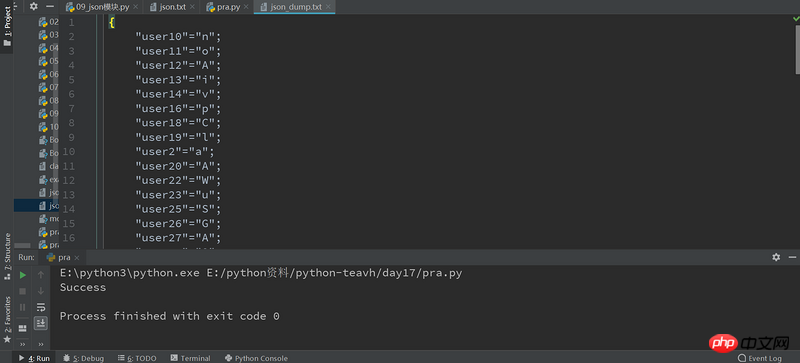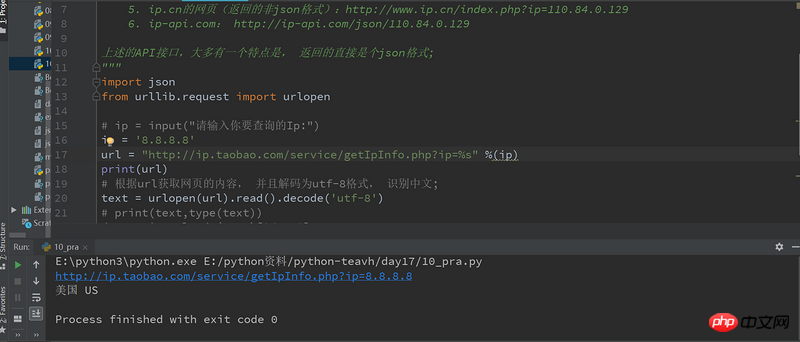How to read and write json data in python (code)
The content of this article is about how python reads and writes json data (code). It has certain reference value. Friends in need can refer to it. I hope it will be helpful to you.
json
Use the Python language to encode and decode JSON objects.
JSON (JavaScript Object Notation) is a lightweight data exchange format that is easy for humans to read and write. To use the json function, you need to import the json module
json.dumps
Encode Python objects into JSON strings
json.loads
is used to decode JSON data. This function returns the data type of the Python field.
Basic commands
Encode the python object into the json string format
d = {'name':'sheen',
'age':17}
jsonStr = json.dumps(d) #{"name": "sheen", "age": 17} <class>
l = [1,3,5,1.2]
jsonList = json.dumps(l) #[1, 3, 5, 1.2] <class></class></class>Decode the obtained json string into the python object
pydict = json.loads(jsonStr) #{'name': 'sheen', 'age': 17} <class>
pylist = json.loads(jsonList) #[1, 3, 5, 1.2] <class></class></class>The python object is encoded into a json string format and written to the file
with open('json.txt','w') as f :
json.dump(d,f)Decode the json string in the file into a python object
with open('json.txt') as f:
jsondict = json.load(f) #{'name': 'sheen', 'age': 17} <class></class>json example
Give 100 A value for each different user is stored in the file 'json_dump.txt', and is in json format
json.dump() parameters
indent
should be a non-negative integer. If it is 0 or empty, the data will be displayed in one line; otherwise, it will wrap and display the preceding blanks according to the number of indents
sort_keys
Sort data according to the value of keys
separators = ("Separator between each element", "key and Separator between values")
#给100个不同的用户一个value值
#存放到文件'json_dump.txt',并且是json格式
import json
import string
from random import choice
keys = ['user'+str(i) for i in range(100)]
values = string.ascii_lowercase+string.ascii_uppercase #大小写字符串
dict = {choice(keys):choice(values) for i in range(100)}
with open('json_dump.txt','w') as f:
#indent:应该是一个非负的整型,如果是0,或者为空,则一行显示数据;否则会换行且按照indent的数量显示前面的空白
#sort_keys:将数据根据keys的值进行排序
#separators = ("每个元素间的分隔符", “key和value之间的分隔符”)
json.dump(dict,f,indent=4,sort_keys=True, separators=(';', '='))
#为何最后文件不够100行?
#因为随机选取的key值可能会重复,字典类型的key不允许重复,最后得到的数据会少于你给定的100次
1. 淘宝的API(推荐):http://ip.taobao.com/service/getIpInfo.php?ip=110.84.0.129 2. 国外freegeoip.net(推荐):http://freegeoip.net/json/110.84.0.129 这个还提供了经纬度信息(但不一定准) 3. 新浪的API:http://int.dpool.sina.com.cn/iplookup/iplookup.php?format=json&ip=110.84.0.129 4. 腾讯的网页查询(返回的非json格式): http://ip.qq.com/cgi-bin/searchip?searchip1=110.84.0.129 5. ip.cn的网页(返回的非json格式):http://www.ip.cn/index.php?ip=110.84.0.129 6. ip-api.com: http://ip-api.com/json/110.84.0.129
import json
from urllib.request import urlopen
# ip = input("请输入你要查询的Ip:")
ip = '8.8.8.8'
url = "http://ip.taobao.com/service/getIpInfo.php?ip=%s" %(ip)
print(url)
# 根据url获取网页的内容, 并且解码为utf-8格式, 识别中文;
text = urlopen(url).read().decode('utf-8')
# print(text,type(text))
data = json.loads(text)['data']
country = data['country']
country_id = data['country_id']
print(country,country_id)
How to use python to read and write json files
The above is the detailed content of How to read and write json data in python (code). For more information, please follow other related articles on the PHP Chinese website!

Hot AI Tools

Undresser.AI Undress
AI-powered app for creating realistic nude photos

AI Clothes Remover
Online AI tool for removing clothes from photos.

Undress AI Tool
Undress images for free

Clothoff.io
AI clothes remover

Video Face Swap
Swap faces in any video effortlessly with our completely free AI face swap tool!

Hot Article

Hot Tools

Notepad++7.3.1
Easy-to-use and free code editor

SublimeText3 Chinese version
Chinese version, very easy to use

Zend Studio 13.0.1
Powerful PHP integrated development environment

Dreamweaver CS6
Visual web development tools

SublimeText3 Mac version
God-level code editing software (SublimeText3)

Hot Topics
 PHP and Python: Different Paradigms Explained
Apr 18, 2025 am 12:26 AM
PHP and Python: Different Paradigms Explained
Apr 18, 2025 am 12:26 AM
PHP is mainly procedural programming, but also supports object-oriented programming (OOP); Python supports a variety of paradigms, including OOP, functional and procedural programming. PHP is suitable for web development, and Python is suitable for a variety of applications such as data analysis and machine learning.
 Choosing Between PHP and Python: A Guide
Apr 18, 2025 am 12:24 AM
Choosing Between PHP and Python: A Guide
Apr 18, 2025 am 12:24 AM
PHP is suitable for web development and rapid prototyping, and Python is suitable for data science and machine learning. 1.PHP is used for dynamic web development, with simple syntax and suitable for rapid development. 2. Python has concise syntax, is suitable for multiple fields, and has a strong library ecosystem.
 Python vs. JavaScript: The Learning Curve and Ease of Use
Apr 16, 2025 am 12:12 AM
Python vs. JavaScript: The Learning Curve and Ease of Use
Apr 16, 2025 am 12:12 AM
Python is more suitable for beginners, with a smooth learning curve and concise syntax; JavaScript is suitable for front-end development, with a steep learning curve and flexible syntax. 1. Python syntax is intuitive and suitable for data science and back-end development. 2. JavaScript is flexible and widely used in front-end and server-side programming.
 PHP and Python: A Deep Dive into Their History
Apr 18, 2025 am 12:25 AM
PHP and Python: A Deep Dive into Their History
Apr 18, 2025 am 12:25 AM
PHP originated in 1994 and was developed by RasmusLerdorf. It was originally used to track website visitors and gradually evolved into a server-side scripting language and was widely used in web development. Python was developed by Guidovan Rossum in the late 1980s and was first released in 1991. It emphasizes code readability and simplicity, and is suitable for scientific computing, data analysis and other fields.
 Can vs code run in Windows 8
Apr 15, 2025 pm 07:24 PM
Can vs code run in Windows 8
Apr 15, 2025 pm 07:24 PM
VS Code can run on Windows 8, but the experience may not be great. First make sure the system has been updated to the latest patch, then download the VS Code installation package that matches the system architecture and install it as prompted. After installation, be aware that some extensions may be incompatible with Windows 8 and need to look for alternative extensions or use newer Windows systems in a virtual machine. Install the necessary extensions to check whether they work properly. Although VS Code is feasible on Windows 8, it is recommended to upgrade to a newer Windows system for a better development experience and security.
 Can visual studio code be used in python
Apr 15, 2025 pm 08:18 PM
Can visual studio code be used in python
Apr 15, 2025 pm 08:18 PM
VS Code can be used to write Python and provides many features that make it an ideal tool for developing Python applications. It allows users to: install Python extensions to get functions such as code completion, syntax highlighting, and debugging. Use the debugger to track code step by step, find and fix errors. Integrate Git for version control. Use code formatting tools to maintain code consistency. Use the Linting tool to spot potential problems ahead of time.
 How to run programs in terminal vscode
Apr 15, 2025 pm 06:42 PM
How to run programs in terminal vscode
Apr 15, 2025 pm 06:42 PM
In VS Code, you can run the program in the terminal through the following steps: Prepare the code and open the integrated terminal to ensure that the code directory is consistent with the terminal working directory. Select the run command according to the programming language (such as Python's python your_file_name.py) to check whether it runs successfully and resolve errors. Use the debugger to improve debugging efficiency.
 Is the vscode extension malicious?
Apr 15, 2025 pm 07:57 PM
Is the vscode extension malicious?
Apr 15, 2025 pm 07:57 PM
VS Code extensions pose malicious risks, such as hiding malicious code, exploiting vulnerabilities, and masturbating as legitimate extensions. Methods to identify malicious extensions include: checking publishers, reading comments, checking code, and installing with caution. Security measures also include: security awareness, good habits, regular updates and antivirus software.






